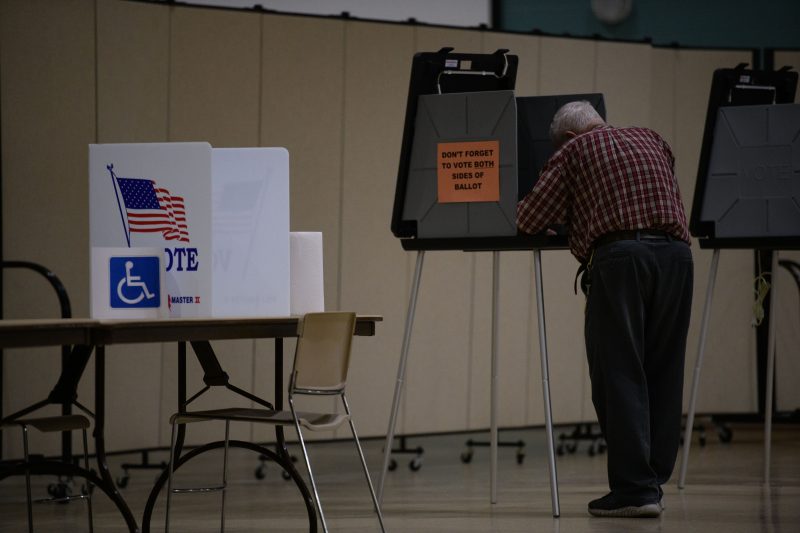Republican victories in last year’s U.S. House elections were chiefly driven by a partisan turnout advantage rather than Democratic defections, according to a study released Wednesday by the Pew Research Center.
The survey of more than 10,000 Americans found 71 percent of voters who supported Donald Trump in 2020 cast ballots in last year’s midterms, compared with 67 percent of those who voted for President Biden. Voters who supported Democrats in the 2018 midterms were 10 percentage points less likely than those who supported Republicans to cast ballots in 2022, 74 percent vs. 84 percent.
The findings suggest a critical challenge for Democrats in 2024 will be convincing voters who supported the party during Trump’s presidency to return to the polls.
The survey found Republicans gained significant support from 2018 to 2022 among Hispanic and Asian voters, younger voters as well as both men and women, echoing results from network exit polls and other surveys. The Pew survey measured vote choice and turnout across several elections for the same voters, providing a unique window into how much results shifted due to voters changing their minds or turning out at different rates.
In 2022, Republican House candidates received 2.8 percentage points more support than Democrats nationwide, a shift from Democrats’ nine-point advantage in 2018. Pew found that all but one to two points of this shift was due to changes in turnout, with only 6 percent of 2018 Democratic voters supporting Republicans in 2022. Similarly, just 6 percent of voters crossed party lines from their 2020 presidential vote, with 93 percent of Biden voters supporting Democratic House candidates in 2022 and 97 percent of Trump voters supporting Republicans.
“Shifts in turnout, as opposed to defections, were responsible for most of the changes in vote margins from the 2018 midterms within most subgroups in the population,” the Pew report said. “People who voted in 2018 who did not turn out in 2022 (‘drop-off’ voters), had favored Democrats in 2018 by about two-to-one (64% to 33%).” Meanwhile, voters who did not vote in 2018 but turned out in 2022 supported Republican candidates by 58 percent to 40 percent last fall.
The president’s party typically loses support in midterm elections and 2022 turnout patterns mark a similar pattern to four years before. In 2018, Pew found Trump voters turned out at lower rates and Democrats won voters who skipped the 2016 election by more than 2 to 1.
The study focused on national support for House candidates and did not explore factors behind results in competitive congressional districts, Senate or gubernatorial elections. Despite Biden’s unpopularity, Democratic incumbents outperformed expectations in many key races against Republicans who denied the 2020 election presidential results or were broadly unpopular. Many GOP candidates in these contests were supported by Trump or aligned themselves with his positions and combative rhetoric.
Democrats retained control of the Senate in 2022, leading to some Republican disappointment and renewed concerns about candidate quality in the GOP and Trump’s influence. Trump is now a candidate for president in 2024 and has emerged as the clear polling leader in the Republican primary.
Pew found White voters made up 75 percent of the national midterm electorate and 57 percent of the group supported Republicans for Congress, up from 52 percent who did so in 2018. While Republicans fared best among White men (60 percent) and those without four-year college degrees (66 percent), GOP support also grew among White women and college grads from four years ago.
Black voters continued to be Democrats’ strongest supporters, with the Pew survey finding 93 percent voted Democratic in 2022, almost identical to their support in 2018 and 2020. The finding contrasts with other surveys released on Election Day finding Black Democratic support dropped to the mid-80s.
The trajectory of Hispanic voters has been closely watched in recent cycles after signs of a shift in the Republican direction. Pew’s survey found Hispanic support for Democrats dropped from a 72 percent in 2018 to 60 percent in 2022, though this was little changed from Biden’s 61 percent support in 2020. Beneath those patterns is enormous churn in Hispanic turnout, with 19 percent of Hispanic eligible voters turning out in all three elections while 33 percent voted in one or two. And while the group had a heavily Democratic tilt in 2018, Pew found 37 percent of those who voted that year did not cast ballots in 2022.
Democrats’ support among Asian voters also dipped from 73 percent in 2018 to 68 percent in 2022. Network exit polls found a larger 19 percentage-point drop in Asian support for Democrats over the same period, but Pew’s finding is similar to a seven-point drop found by the AP VoteCast survey. Asian voters made up 3 percent of the electorate last year according to Pew, and estimates of vote support among small groups carry a large margin of sampling error.
The Pew survey found Republicans gained ground among younger voters, with support rising from 23 percent among 18 to 29 year-olds in 2018 to 31 percent in 2022. Still, the Pew survey showed relatively good results for Democrats among younger voters. While citizens under 30 made up just 10 percent of the electorate last year, Pew found 68 percent of those who turned out supported Democrats, down slightly from 72 percent in 2018 but up from Biden’s 61 percent mark among young voters in 2020. Other surveys suggested Democratic support had fallen sharply — to as low as 54 percent last year according to AP VoteCast.
The Pew Research Center survey was conducted Nov. 16-27, 2022, among 10,696 U.S. citizens who were compared with voter registration and turnout records, including 7,461 for whom reliable data on turnout and vote choice were available. The survey was conducted through Pew’s American Trends Panel, an ongoing survey panel recruited through random sampling of U.S. households.
Emily Guskin contributed to this report.






























